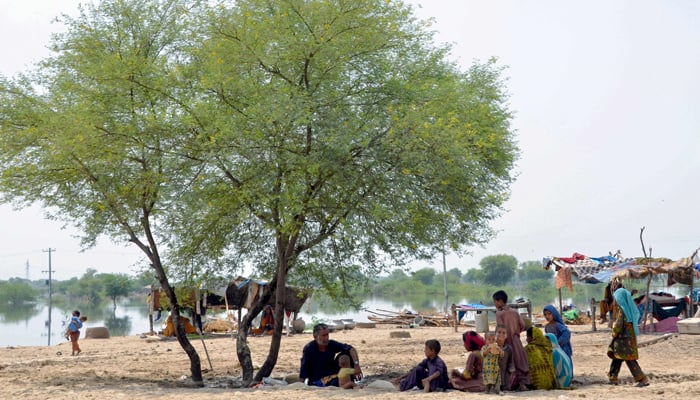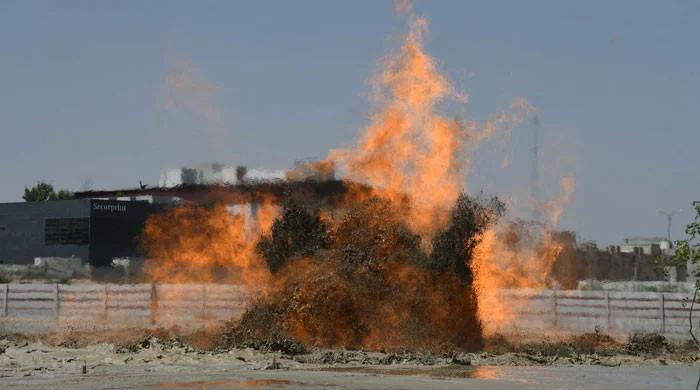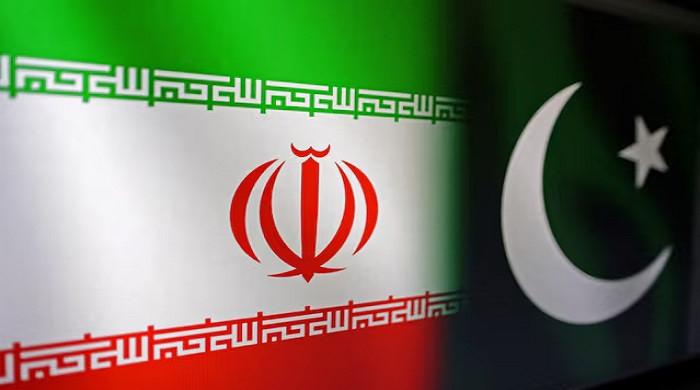Report identifies Pakistan as 'highly vulnerable' to climate change impacts
Need emphasised for developed nations to provide greater aid to poorer ones facing heightened vulnerability
July 13, 2023

- Climate change will remain primary force influencing policy-making.
- Need for developed nations to help poorer ones stressed upon.
- Africa's underdeveloped nations will endure most severe impacts.
KARACHI: Pakistan is categorised as "highly" susceptible to climate change impacts, according to a recent report published by the Economist Intelligence Unit on Wednesday.
The report, 'The climate change crisis: Understanding the trends affecting an unpredictable future', mentioned that the changes in climate would remain the primary force influencing policy-making and societal shifts in the foreseeable future.
It further emphasises the need for developed nations to provide greater aid to poorer ones that face heightened vulnerability to the destructive consequences of changing climate patterns around the world.
The report highlights the UN Intergovernmental Panel on Climate Change estimates which indicate how Africa's underdeveloped countries will endure the most severe affects of irreversible climate change consequences.
Even if countries are able to meet the 2°C target regarding global temperatures, the impacts of events like extreme storms, droughts, heatwaves, and flooding will still be “unprecedented”, according to the EIU report.
Pakistan, having witnessed apocalyptic floods in 2022, has taken some notable steps to mitigate the physical impacts of climate change. Its project ‘Recharge Pakistan’ has been approved by the Green Climate Fund (GCF), news that was shared by Minister for Climate Change Sherry Rehman on July 11 on her Twitter account.
According to her tweet, “[the] Recharge Pakistan project, which will be implemented over the next 7 years, has been approved today for funding of $77.8 million.” GCF financing of $66 million makes up 84.8% of the total funds required for the project. The remaining 15.2% of the funds will be covered by other co-financiers.
The financing, which was originally in the form of loans, will now come as grants.
A separate tweet by Rehman said: “After the 2022 megaflood (sic) our view was that Pakistan needs grant-based climate financing, and [we are] grateful to the GCF for accepting our advice.”
The information available on the Green Climate Fund’s website says “the primary objective of the Recharge Pakistan initiative is to transform the country’s approach to flood and water resource management in local watershed sites in the Indus Basin river system."
"This will be accomplished by implementing ecosystems-based adaptation (EbA) and green infrastructure interventions, as well as enhancing community-based natural resource management. These activities will address long-term drought and flood resilience, while establishing a paradigm shift for future EbA initiatives in Pakistan.”
While such initiatives will help vulnerable countries mitigate the risks and impacts of climate change, “there is still a need for more money to fight climate change”, as per the EIU report. A reason for countries’ inability to meet their climate goals is the lack of private investment. In the South Asian region, close to 70 per cent of the total climate financing (2019-2020 average) came from the public sector.
The 2022 Ukraine war has become the biggest disruptor in recent days. Besides having a negative impact on global supply chains, it has also reversed the progress made on clean energy initiatives. As countries tackle the energy crisis, they turn to fossil fuels.
In 2022, the share of fossil fuels in total global energy consumption stood at 81%. The EIU estimates it to drop to 78% by 2032. However, there are countries whose reliance on fossil fuel will remain. Pakistan is one of the top 10 countries where fossil fuel consumption is rising and will continue throughout 2023.
The report predicts that investment into sustainable finance will further dip in 2023. “Ultra-low interest rates amid the pandemic triggered a surge in sustainable financing...with record high inflows of funds-based on environmental, social and governmental (ESG) standards in 2021.”
But as the energy crisis emerged in the wake of the Ukraine war, the funding dropped. Factors like high inflation, rising interest rates and recession fears also made investors look for other options. The EIU does not see any ESG investment boom in 2023. But it says that the appeal of sustainable finance will improve in 2024 as the global economy recovers.
Things are set to be challenging for governments around the world with food prices possibly increasing. The EIU report says that lack of rain in North Africa will threaten harvests and low rainfall in Europe will contribute towards rising food prices.
In Europe, rising food prices are already contributing more towards annual inflation than energy. The EIU “expect crop yields to be lower in 2023 [in Europe], which may push food prices higher and put further inflationary pressure on the economy.” This may lead to public discontent and create challenges for governments as they try dealing with the cost-of-living crisis.











